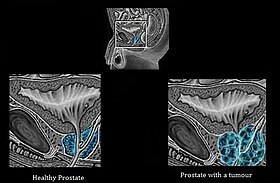| Androgen deprivation therapy | |
|---|---|
 Differences between a healthy prostate and a prostate with a tumour | |
| Other names | Androgen suppression therapy |
| Specialty | oncology |
Androgen deprivation therapy (ADT), also called androgen ablation therapy or androgen suppression therapy, is an antihormone therapy whose main use is in treating prostate cancer. Prostate cancer cells usually require androgen hormones, such as testosterone, to grow. ADT reduces the levels of androgen hormones, with drugs or surgery, to prevent the prostate cancer cells from growing.[1] The pharmaceutical approaches include antiandrogens and chemical castration.
Several studies have concluded that ADT has demonstrated benefit in patients with metastatic disease, and as an adjunct to radiation therapy in patients with locally advanced disease, as well as those with unfavorable intermediate-risk or high-risk localized disease. However, in patients with low-risk prostate cancer, ADT has demonstrated no survival advantage, and significant harm, such as impotence, diabetes and bone loss.[2][3][4][5][6]
The therapy can also eliminate cancer cells by inducing androgen deprivation-induced senescence.[7] Lowering androgen levels or stopping them from getting into prostate cancer cells often makes prostate cancer shrink or grow more slowly for a time. However, this treatment needs to be combined with radiation therapy (RT)[8] because ADT itself does not eradicate the cancer; it just decreases its aggressiveness.[9]
- ^ Perlmutter and Lepor (2007). "Androgen Deprivation Therapy in the Treatment of Advanced Prostate Cancer". Rev Urol. 9 (Suppl 1): S3–8. PMC 1831539. PMID 17387371.
- ^ "Prostate Cancer is Focus of 2 Studies, Commentary". JAMA Internal Medicine, Media Releases. July 14, 2014.
- ^ Grace L. Lu-Yao; Peter C. Albertsen; Dirk F. Moore; et al. (September 2014). "Fifteen-Year Survival Outcomes Following Primary Androgen-Deprivation Therapy for Localized Prostate Cancer". JAMA Intern. Med. 174 (9): 1460–1467. doi:10.1001/jamainternmed.2014.3028. PMC 5499229. PMID 25023796.
- ^ Quoc-Dien Trinh; Deborah Schrag (September 2014). "Measuring the Effectiveness of Androgen-Deprivation Therapy for Prostate Cancer in the Medicare PopulationAdequate Data Are Neither the Same as Nor the Enemy of Perfect Data". JAMA Intern. Med. 174 (9): 1468–9. doi:10.1001/jamainternmed.2014.1107. PMID 25023522.
- ^ Karen E. Hoffman; Jiangong Niu; Yu Shen; et al. (September 2014). "Physician Variation in Management of Low-Risk Prostate Cancer: A Population-Based Cohort Study". JAMA Intern. Med. 174 (9): 1450–9. doi:10.1001/jamainternmed.2014.3021. PMC 4372187. PMID 25023650.
- ^ ANAHAD O'CONNOR (July 14, 2014). "Study Discounts Testosterone Therapy for Early Prostate Cancer". New York Times.
There are so many side effects associated with this therapy, and really little evidence to support its use," said Dr. Grace L. Lu-Yao, a researcher at the Rutgers Cancer Institute of New Jersey and the lead author of the report, published on Monday in JAMA Internal Medicine. "I would say that for the majority of patients with localized prostate cancer, this is not a good option.
- ^ Burton, Dominick G. A.; Giribaldi, Maria G.; Munoz, Anisleidys; Halvorsen, Katherine; Patel, Asmita; Jorda, Merce; Perez-Stable, Carlos; Rai, Priyamvada; Agoulnik, Irina U. (27 June 2013). Agoulnik, Irina U. (ed.). "Androgen Deprivation-Induced Senescence Promotes Outgrowth of Androgen-Refractory Prostate Cancer Cells". PLOS ONE. 8 (6): e68003. Bibcode:2013PLoSO...868003B. doi:10.1371/journal.pone.0068003. PMC 3695935. PMID 23840802.
- ^ Warde, Padraig; Mason, Malcolm; Ding, Keyue; Kirkbride, Peter; Brundage, Michael; Cowan, Richard; Gospodarowicz, Mary; Sanders, Karen; Kostashuk, Edmund; Swanson, Greg; Barber, Jim; Hiltz, Andrea; Parmar, Mahesh K.B.; Sathya, Jinka; Anderson, John; Hayter, Charles; Hetherington, John; Sydes, Matthew R.; Parulekar, Wendy; for the NCIC CTG PR.3/MRC UK PR07 investigators (2011). "Combined androgen deprivation therapy and radiation therapy for locally advanced prostate cancer: a randomised, phase 3 trial". The Lancet. 378 (9809): S2104–2111. doi:10.1016/s0140-6736(11)61095-7. PMC 3243932. PMID 22056152.
{{cite journal}}: CS1 maint: numeric names: authors list (link)"Combined androgen deprivation therapy and radiation therapy for locally advanced prostate cancer: a randomised, phase 3" - ^ Science Daily